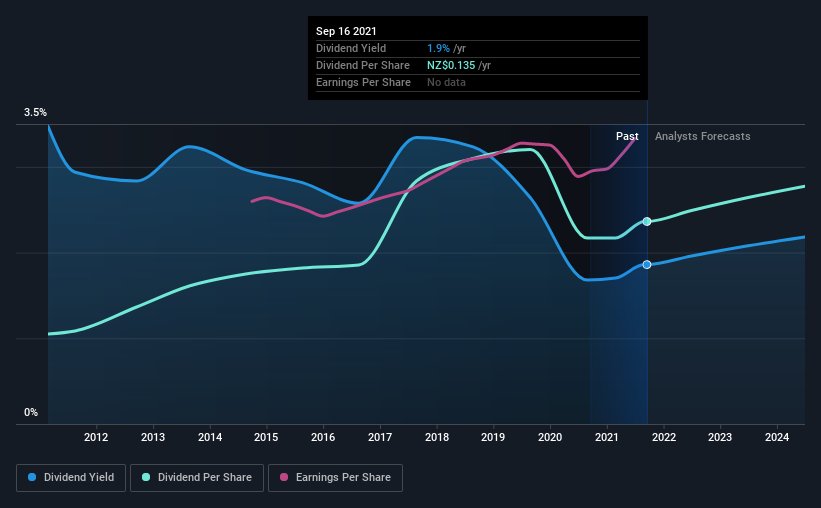Port of Tauranga (NZSE:POT) Has Announced That It Will Be Increasing Its Dividend To NZ$0.088
Port of Tauranga Limited (NZSE:POT) will increase its dividend on the 1st of October to NZ$0.088. This takes the dividend yield from 1.9% to 3.4%, which shareholders will be pleased with.
View our latest analysis for Port of Tauranga
Port of Tauranga Doesn't Earn Enough To Cover Its Payments
A big dividend yield for a few years doesn't mean much if it can't be sustained. Before making this announcement, Port of Tauranga was paying out quite a large proportion of both earnings and cash flow, with the dividend being 125% of cash flows. Paying out such a high proportion of cash flows certainly exposes the company to cutting the dividend if cash flows were to reduce.
Earnings per share is forecast to rise by 5.0% over the next year. However, if the dividend continues growing along recent trends, it could start putting pressure on the balance sheet with the payout ratio reaching 161% over the next year.
Dividend Volatility
The company has a long dividend track record, but it doesn't look great with cuts in the past. The first annual payment during the last 10 years was NZ$0.06 in 2011, and the most recent fiscal year payment was NZ$0.14. This works out to be a compound annual growth rate (CAGR) of approximately 8.4% a year over that time. A reasonable rate of dividend growth is good to see, but we're wary that the dividend history is not as solid as we'd like, having been cut at least once.
The Dividend Has Growth Potential
With a relatively unstable dividend, it's even more important to evaluate if earnings per share is growing, which could point to a growing dividend in the future. Port of Tauranga has seen EPS rising for the last five years, at 5.7% per annum. Recently, the company has been able to grow earnings at a decent rate, but with the payout ratio on the higher end we don't think the dividend has many prospects for growth.
Port of Tauranga's Dividend Doesn't Look Sustainable
Overall, we always like to see the dividend being raised, but we don't think Port of Tauranga will make a great income stock. The track record isn't great, and the payments are a bit high to be considered sustainable. We don't think Port of Tauranga is a great stock to add to your portfolio if income is your focus.
Companies possessing a stable dividend policy will likely enjoy greater investor interest than those suffering from a more inconsistent approach. However, there are other things to consider for investors when analysing stock performance. Companies that are growing earnings tend to be the best dividend stocks over the long term. See what the 5 analysts we track are forecasting for Port of Tauranga for free with public analyst estimates for the company. If you are a dividend investor, you might also want to look at our curated list of high performing dividend stock.
This article by Simply Wall St is general in nature. We provide commentary based on historical data and analyst forecasts only using an unbiased methodology and our articles are not intended to be financial advice. It does not constitute a recommendation to buy or sell any stock, and does not take account of your objectives, or your financial situation. We aim to bring you long-term focused analysis driven by fundamental data. Note that our analysis may not factor in the latest price-sensitive company announcements or qualitative material. Simply Wall St has no position in any stocks mentioned.
Have feedback on this article? Concerned about the content? Get in touch with us directly. Alternatively, email editorial-team (at) simplywallst.com.

 Yahoo Finance
Yahoo Finance 
